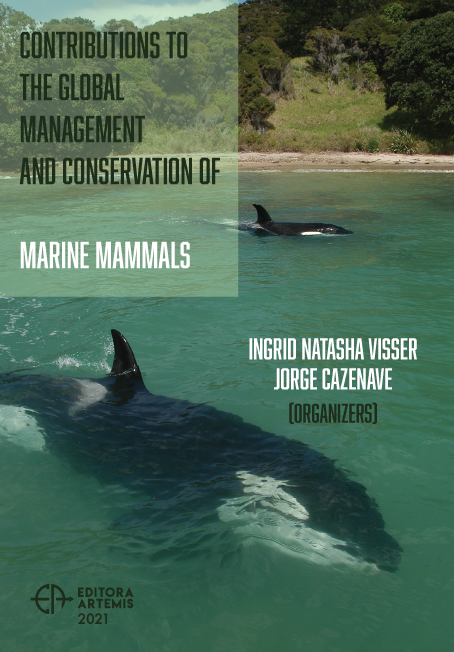
Contributions to the Global Management and Conservation of Marine Mammals
I write the introduction to this book after just having returned from a day out researching wild orca along the New Zealand coastline. During that encounter I had the opportunity to not only see the orca hunting for rays in the shallow waters, but an adult male orca, known to me since he was born, became stranded as he followed his family over a sand bank. His calm demeanour was indicative to me that he had experienced such an event before. Whilst stranded, he patiently tested the water depth, and his ability to get off the sand bank, by gently rolling from side to side every 10 mins or so. During the time that he was stranded our team poured water over him in order to prevent his skin drying out. Eventually the tide had returned enough for him to focus all his energy into getting off and into deeper water. Within minutes of freeing himself he was back with his family and within an hour he was catching rays again. It struck me as I was watching him, that he was around 30 years old, older than I was when I started studying his family. The changes he had seen in his lifetime are changes that I’ve documented too. Encroachment into his habitat with new marinas, wharfs, reclamation and dredging. Exclusion from prime hunting area from all of these man-made features as well as aquaculture farms expanding so fast it is hard to document them all. He has seen the numbers of vessels increase exponentially and the volume of noise pollution expand with it. He has experienced raw sewage flowing around him when he has entered into harbours and he has swum past floating garbage and viewed sunken junk discarded in his home. He has seen members of his social network drown when entangled, die when stuck on a beach and suffer from severe wounds when hit by boats. It is a wonder he has survived as long as he has with all this and more that he must contend with. But, despite all these negative aspects, there is some hope; New Zealand now has more than 30 marine reserves (protected areas to prevent fishing and habitat destruction). Although they are comprised of only a tiny part of the entire coastline, they are a start. I also see a growing number of scientists, lawyers, researchers and field biologists interested in contributing towards conservation and management issues. My hope is that this volume will provide a platform for some of those studies to reach a wide audience and to make a difference for individual cetaceans, their populations and the habitats that they not only live in but require to survive. The book is arranged by author, rather than, species, region or topic as the first two categories ranged across multiple species and around the globe and yet at times also overlapped, whilst the topics were just as diverse.
Ingrid N. Visser (PhD), New Zealand
Contributions to the Global Management and Conservation of Marine Mammals
-
DOI: 10.37572/EdArt_100321286
-
ISBN: 978-65-87396-28-6
-
Palavras-chave: 1. Marine mammals – Conservation. I. Natasha, Ingrid. II.Cazenave, Visser Jorge.
-
Ano: 2021
- Adriana Vieira de Miranda
- Claudia Pons Bordas
- Fábia de Oliveira Luna
- Francisco Javier Aznar Avendaño
- Gabriela Bellazzi
- Glaucia Pereira de Sousa
- Ingrid Natasha Visser
- Jorge Cazenave
- Juan Manuel Copello
- Juan Pablo Torres-Florez
- Lars Kleivane
- Matheus Lopes Soares
- Matthew Volk Spiegl
- Mercedes Fernández Martínez
- Natalia Fraija Fernández
- Natalie Nicole Barefoot
- Nils Øien
- Pedro Friedrich Fruet
- Terry M. Hardie
- Tracy E. Cooper
Artigos
- ARGENTINEAN ORCA (<I>ORCINUS ORCA<I>) AS AN UMBRELLA SPECIES: CONSERVATION & MANAGEMENT BENEFITS
- INCREASING THE UNDERSTANDING OF MULTISPECIES FEEDING EVENTS IN MARINE HOTSPOTS BY MEDIUM TERM INSTRUMENTATION AND TRACKING.
- PARASITES AS INTEGRAL ELEMENTS OF CETACEAN BIOLOGY: THE DIGENEAN PHOLETER GASTROPHILUS AS A CASE STUDY
- STRANDING MONITORING PROGRAMMES IN BRAZILIAN COAST: ANALYSIS OF REPORTS
- TRIALS AND TRIBULATIONS: THE CONSERVATION IMPLICATIONS OF AN ORCA SURVIVING A STRANDING AND BOAT STRIKE. A CASE STUDY
- WILDLIFE CONSERVATION AND PUBLIC RELATIONS: THE GREENWASHING OF MARINE MAMMAL CAPTIVITY
